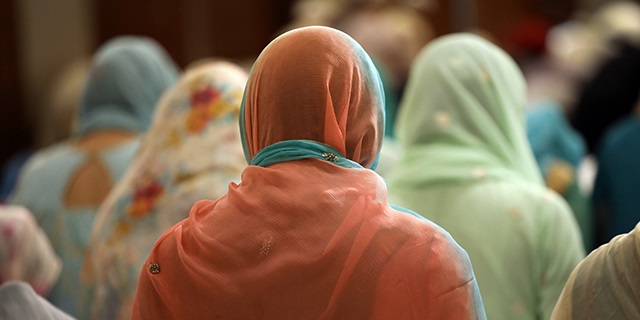Madinah asked some of her male friends their view on her recitation of the Qur’an in public, “A woman should not have to curb her piety just because a man is somehow distracted.” Another said, “A pious person will focus more on the words of God, than the voice of the person.” Madinah concluded her speech adding that “Women’s voices are important and they need to be heard.”

Women’s Identity in Religion
Similar views were expressed by Egyptian-born Dr. Shuruq Naguib, who teaches Philosophy and religion at Lancaster University.
“We keep talking about women in the Qur’an but what about women in the Seerah? The formative history of Islam, the role of women in the production of knowledge but also the production of norms and societal structures. These are all important aspects that we seem to be ignoring,” she said.
“We are often actually drawn to the politicized topics, let’s all work on wife-beating, let’s all work on rape and sexuality issues in the marital paradigm. I would say, let’s work on purity, let’s work on ritual, let’s work on the meaning of salah. There are a lot of trajectories and agendas that need to be approached and we’re often thinking in a narrow lens.”
Dr. Shuruq went on to explain the challenges faced by early women including Aisha, the Prophet’s wife who was in her own right a leader and a teacher.
“Aisha had certain tensions with some of the hadith transmitters, surrounding the interpretation of certain hadith, even with Abdullah Ibn Abbas (one of the most famous companions), when he started to separate his wife from his bed when she was menstruating. Aisha called him in, scolded him and told him, me and the Prophet we only had one bed, so why aren’t you following the Sunnah?
“We need to understand exactly how the interpretative agency developed, what constrained it, and today compare to the number of women who are involved in education. There might have been an excuse because the way society was structured in pre-modern times, preventing many woman, many women did not have access religious education.
“There are so many supportive men (encouraging the involvement of women) but the institutions are less accessible. The forms of authority that men have are not extended to women because of institutional issues and other types of attitudes. These attitudes are not specific to men only, you find them across the board. Sometimes when I speak of women leading prayers, and I was just talking about a woman leading an all-woman congregation, the main objectors were women.
“That is why I am saying that part of raising awareness, the transformative part of Islamic studies is not just to put forward a new type of progressive theology, but actually to read the history again very carefully, both in terms of religious thought and religious practice, and it’s often shocking. I have sometimes Muslims students who go through a crisis, just for reading a Muslim text, written by an (Islamic) jurist, and finding that jurist far more open to the idea of women qadis (judges) than they thought the Islamic traditions should be.
“There are certain perceptions of the (actual) Islamic traditions, that don’t map onto the Islamic tradition (that is taught).”
 Pages: 1 2 3
Pages: 1 2 3